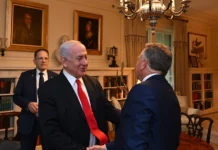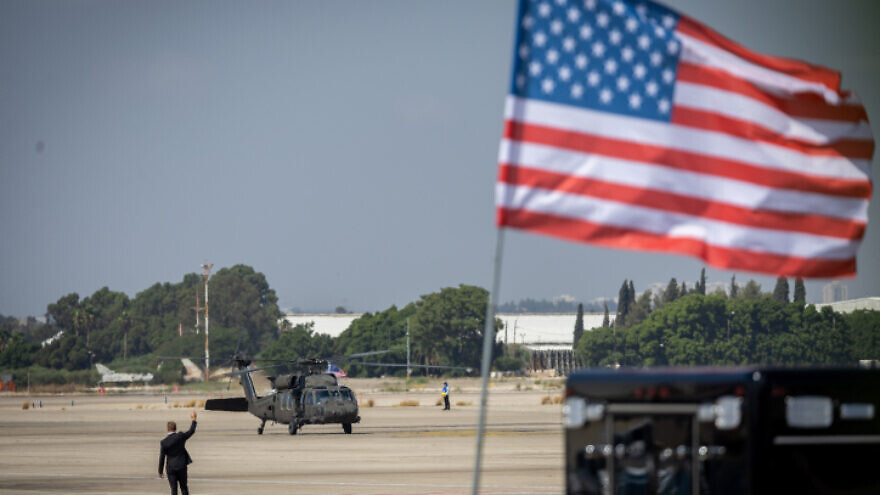The debate in Israel about the significance of U.S. President Joe Biden’s recent visit to Israel and affirmation of America’s “bone-deep” relationship with the Jewish state should make way for a far more serious question. Biden wasn’t lying when he told Channel 12’s Yonit Levi in an interview last week that he considers the anti-Israel members of his party to be “wrong.”
The very fact that the pronouncement made such bold headlines goes to show that what he said had been in some kind of doubt. But Biden has never been a radical, despite his eight years under former President Barack Obama, a loyal Alinskyite on a mission to erode America internally and “lead from behind” abroad.
What hasn’t changed is his position on the “peace process.” And here is where his same old colors were on full display, which rendered his joint pledge with Israeli Prime Minister Yair Lapid to prevent Iran from obtaining nuclear weapons worse than meaningless.
Just ask the United Arab Emirates, which seems to be hedging its bets where American resolve and power is concerned. When Biden arrived in Saudi Arabia on Friday, the UAE president’s diplomatic adviser, Anwar Gargash, announced that his country was working to dispatch an ambassador to Iran as part of an effort to “rebuild bridges” with Tehran.
This was as shocking as it was a terrible omen. After all, the UAE was the original signatory, along with Bahrain, of the Abraham Accords.
The importance of the normalization agreements—brokered by Biden’s predecessor, Donald Trump—cannot be overstated. Nor can the flourishing ties between Israel and its Muslim-Arab neighbors in the Gulf that erupted before the ink was dry on the document, and that spurred other former regional foes to follow suit.
A key draw for these countries was the creation of a strong, U.S.-backed axis against the Islamic Republic. Though many other benefits have arisen from the treaty, standing firm against Tehran was the impetus from which the rest derived, which is why the mullah-led regime vociferously opposed it.
Another crucial element of the Abraham Accords was that they finally exposed as a lie the longstanding premise that no peace could be possible in the Middle East without a solution to the Israeli-Palestinian conflict. Israeli opposition leader Benjamin Netanyahu, who was prime minister at the time of the signing of the treaty in September 2020, and who was instrumental in bringing it about, always understood that this common wisdom was false.
The subsequent defeat of Trump in the United States and of Netanyahu in Israel caused a shakeup. The Biden administration promptly shunned Trump’s withdrawal from the Obama-orchestrated Joint Comprehensive Plan of Action, and began the process of pleading with Tehran to return to some form of it. The government that succeeded Netanyahu’s (first led by Naftali Bennett and now by Yair Lapid) stated plainly that it would inform Washington of any strategic/military moves.
The ayatollahs haven’t been the only ones observing these developments. All parties to the Abraham Accords are watching, too, as were those who attended the Negev summit in March and heard U.S. Secretary of State Antony Blinken state that the “regional peace agreements are not a substitute for peace with the Palestinians.”
In one fell swoop, Blinken resuscitated the faux centrality of Palestinian centrality to peace—and he did so as terrorists were slaughtering innocent people in the streets of Hadera (and other cities prior to and immediately after the gathering in Sde Boker).
Hence, for the past year and a half, they’ve had reason to be nervous about putting their faith in a U.S.-led, anti-Iran coalition with Israel at the forefront. There is no other explanation for the UAE to take the opportunity of Biden’s Israel-Saudi sojourn to reveal that it is trying to mend fences with Iran; that and Biden’s reiteration of the “two-state solution” mantra and pilgrimage to the P.A. to meet with and promise lots of money to head honcho Mahmoud “pay-for-slay” Abbas.
Team Biden’s behavior also sheds light on the Saudis’ tired lip service to the kingdom’s “requirements for peace” being “a two-state settlement with a Palestinian state in the occupied territories with east Jerusalem as its capital.”
This is what Saudi Foreign Minister Adel al-Jubeir said on Saturday, echoing the “Jeddah Communique” between the United States and Saudi Arabia that was signed and released on Saturday. Yet, two days earlier, the Saudi General Authority of Civil Aviation opened the country’s airspace to all civil aircraft, including Israel’s.
It’s no small gesture, and no thanks to Biden, whose foreign-policy moves undermine and threaten the Abraham Accords that Trump and Netanyahu carefully crafted. Nevertheless, he is simultaneously taking credit for the paradigm shift and trying to undo it.
Let’s hope that his endeavor is as big a failure as his presidency. Let us pray, as well, that Israelis wake up to the perils of having a government in Jerusalem that enables, if not outright espouses, the thinking that is allowing Iran to possess nuclear bombs and the P.A. to commit mass murder with impunity and international support.
Ruthie Blum is an Israel-based journalist and author of “To Hell in a Handbasket: Carter, Obama, and the ‘Arab Spring.’ ”
























